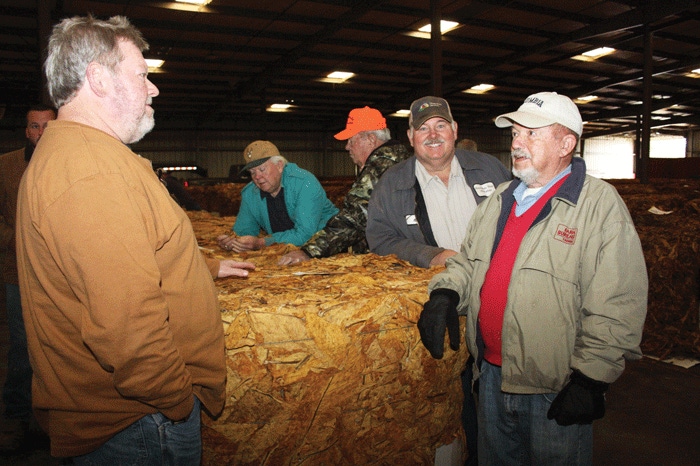December 5, 2012

The legendary cry of the tobacco auctioneer ― largely silenced since the quota buyout of 2004 ― is beginning to be heard once again in the leaf-producing states.
Auctions have regained a place in marketing of the crop.
That was clear on the last Tuesday in October, when a total of 265,000 pounds of flue-cured and a little burley moved into the trade in an auction held in the Old Belt Tobacco Sales warehouse in Rural Hall, N.C.
The average price was just under $2.02 per pound, very competitive with contract delivery stations. Many of the lots brought $2.20 a pound, also very high, and there were substantially no rejections of bids by farmers.
This was the third year that Old Belt Tobacco Sales has conducted auctions in Rural Hall, 10 miles north of Winston-Salem.
In 2010, the warehouse sold five million pounds, then 2.5 million pounds in 2011, when Hurricane Irene reduced the tobacco available.
“Much of what we sell is contract tobacco that didn't meet company quality standards or crop throw, or in excess of the contract," said White. But he also sells any premium tobacco brought to him, and plenty was brought in 2012.
The first auction this year took place on Aug. 28, and White planned to keep selling as long as there was a need. The great majority of what had been sold through October was flue-cured but some burley had been marketed.
Rural Hall wasn't the only market to have an auction for flue-cured in 2012. In Danville, Va., the Piedmont Warehouse operated a conventional auction this past season.
Jim Eggleston, one of the partners running the auction, said in October that sales this season went very well. “We got prices comparable to contract prices, and some grades brought higher than contract prices,” he says. “There was a lot of demand.”
For Piedmont Warehouse, also, this was the third year of auctions, said Eggleston. “There has definitely been some dissatisfaction with contracting in this area.”
Much of the tobacco at both warehouses was excess production by farmers who because of better-than-expected yields produced more leaf than needed to fulfill a conventional contract.
Still more of it was tobacco that had been contracted, but then either didn't meet the company's quality standard or wasn't valued high enough to satisfy the grower.
Destined for auction
But a small portion was tobacco that was destined for the auction from the time it was planted. That usually occurred when a farmer got a contract, but it wasn’t enough to cover the tobacco he wanted to plant.
White told of one man who farms close to Rural Hall who had gotten a contract for his whole crop this year. But to fulfill it, he was going to have to carry his leaf 65 miles to Danville, Va.
He decided to try Old Belt Warehouse instead. He sold some there, liked the price and treatment he got, he ended up selling 100 percent at the auction.
“His average price was well above the contract price,” White said.
Burley growers have access to auctions sales this season as well. At least three warehouses were expected to conduct auctions ― they are in Mount Sterling, Lexington and Danville, all in Kentucky. Some others may be organized in smaller markets.
Farmers Tobacco Warehouse of Danville held its first auction of the year on Nov. 5, and it was a tremendous success.
“We sold 195,000 pounds for $1.98 a pound at our opening sale,” said owner Jerry Rankin. “It was as good a floor of tobacco as you could possibly want to see. The color was excellent, and the quality and texture were very good.”
Buyers competed for the lots they wanted, and farmers showed their satisfaction by not turning tags. Burley sales for this crop will last well into 2013, and both Rankin and White plan to auction again in 2013-14.
Conventional auctions still have a small but loyal following among burley growers, like Kentuckian Scott Travis. He never felt really comfortable about the contracting system, so this year, for the first time since contracting began, he is selling 100 percent of his production at auction.
“My trust of the people running the Danville auction is the big reason I sell there,” said Travis, who farms in Cox's Creek, Ky., near Louisville.
“To me, it seems like a good alternative to contracting."
Most farmers need a contract to get financing to produce their crop, he said. “But smaller farmers like me can get by without one, so I would say the auction system has a place serving the smaller farmer.”
Auctions offer an additional advantage to smaller burley growers, said Travis.
“We can sell there in either large or small bales,” he said.
“For us, it’s cheaper to produce small bales. I have a large baler, but the stripping with it is somewhat hindered because of the space available.”
The room he has it in was built for a small baler.
“It hasn’t retrofitted to the large baler very well. If I had to go back to large bales, I would have to make changes to the stripping room or build another one.”
You May Also Like




